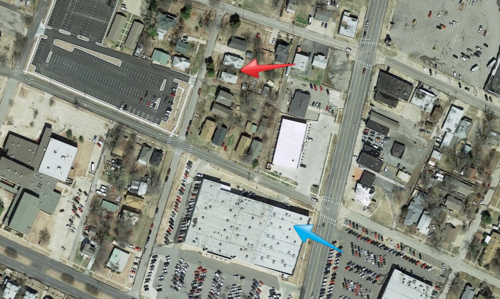A must-read from the Oklahoma Court of Appeals. In City of Muskogee v. Phillips, No. 111,501 (Nov. 21, 2014), the court invalidated a taking, concluding that it was not a public use under the Oklahoma Constitution for a city to condemn private property for a parking lot when the primary apparent beneficiary of the parking lot would likely be the owner of a nearby office building whose tenants were responsible for an increase in on-street parking in the neighborhood.
Quick background: the federal government leased a privately-owned office building for a call center (the blue arrow on the above map). Employees of the call center parked on the street in the neighborhood. The city decided to build a parking lot and parking structure “for the health and safety of the Citizen’s [sic] of Muskogee by reducing the volume of on-street parking in the areas near and surrounding” the call center, and needed 5 privately-owned properties to do so. Slip op. at 2. The city offered $33,700 for the Phillips’s home and land (the red arrow). The Phillips objected, but the trial court concluded the taking was for public use.
The court of appeals reversed, holding that the taking was not for public use under the Oklahoma Constitution because the parking facility “was designed and established primarily for the purpose of serving a private entity and/or employees of that entity’s tenant.” Slip op. at 7-8. The court concluded, “[f]urther, insomuch as we find the proposed parking facility is primarily dedicated to serving the VA Benefits employees and/or Landlord in providing an off-site parking facility for its tenant, the taking of private property for such private purpose is constitutionally impermissible.” Id. at 9. The court was particularly concerned with a provision in an agreement between the city and the operator of the future parking facility in which the city agreed that the parking spaces would be offered to the employees first before they would be offered to the public. Moreover, the city manager testified that under the agreement, if those employees wanted to lease all of the parking spaces, “they could.” Id. at 7.
More on the case from D.E. Smoot at the Mukogee Phoenix, “Appeals court sides with homeowners in parking lot litigation.”
Several points to highlight in this quick (10 page) opinion:
- To determine pubic use, the court looked to the facts of the case, and not only the city’s purported reasons for the taking. It rejected the city’s argument that the parking lot was a public utility, and therefore must be a public use. Id. at 8 n.7 (“Muskogee cannot avoid constitutional restrictions on the power of eminent domain by merely labeling the proposed parking facity as a public utility.”). The court reaffirmed the role of judicial review, holding “[t]he purpose and use behind the exercise of eminent domain – here the purpose and use of the parking lot – must be analyzed to discern if it pases constitutional muster.” Id.
- The court focused on the primary purpose of the taking. It was enough that the evidence demonstrated that the main beneficiary would be the private landlord or its tenant’s employees. See id. at 9 (“insomuch as we find the proposed parking facility is primarily dedicated to serving the VA Benefits employees and/or Landlord in providing an off-site parking facility for its tenant …”). Notice that the court didn’t say “solely” or “only.”
- On a related note, the court didn’t deny that the taking might have some public benefit, but concluded that the main use and benefit was private.
- The court recognized that under the Oklahoma Constitution — contrary to the federal takings clause and Kelo — “economic development” alone is not enough to justify the use of eminent domain. See id. at 8-9 (“Lowery clearly provides that in the context of eminent domain, economic development alone (not in connection with the removal of blighted property) does not constitute a public use or public purpose to justify the exercise of eminent domain as a matter of Oklahoma constitutional law.”).
Overall, a good opinion, and a solid analysis with lessons for state courts and those who advocate for property owners: until the day when the U.S. Supreme Court sees the light and overrules Kelo, Midkiff, and Berman and restores the role of the judiciary in reviewing claims of public use in eminent domain under the Fifth and Fourteenth Amendments, state constitutional protections may (and should) offer more protection to property owners than their federal counterparts.
City of Muskogee v. Phillips, No. 111,501 (Ok. App. Nov 21, 2014)
